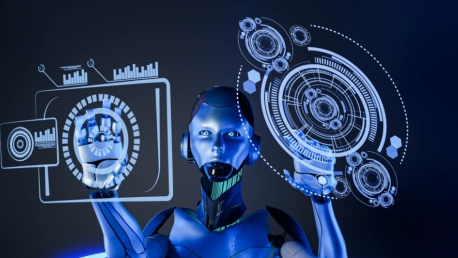With millions of industrial robots already in operation throughout the world, efficiency and accuracy are the values underlying the adoption of new technologies. However, the image of a relentless, continuously accurate machine, one that does everything much faster, raises a fair question for each of us: will my job be automated at some point? The question is especially troubling for those who work desk jobs or those who perform repetitive tasks on production lines.
In this article, we will explore some recent statistics and forecasts on this issue and see what the experts have to say.
Generative AI Could Impact 300 Million Jobs
Goldman Sachs economists have estimated that the latest wave of artificial intelligence (AI), which has given rise to platforms like ChatGPT, could automate as many as 300 million full-time jobs globally.
According to the report, 18% of work worldwide has the potential to be computerized, with more significant impacts on advanced economies than emerging markets. Industry experts predict that white-collar workers, particularly administrative workers and lawyers, are more vulnerable to automation than manual laborers.
Physically demanding or outdoor jobs, such as construction and repair work, are expected to be less affected. In the US and Europe, two-thirds of current jobs are exposed to some degree of AI automation, with up to a quarter of all work potentially being done entirely by AI.
The economists warn that, if generative artificial intelligence delivers on its promised capabilities, significant disruptions to the labor market could ensue. The term refers to the technology behind ChatGPT, the chatbot phenomenon that has taken the world by storm.
Automation and AI Are Taking Over Human Roles in the Workforce
The rapid pace at which automation and AI are taking over human roles in the workforce is astonishing and represents an unparalleled threat of significant economic disturbances and societal unrest.
In 2017, McKinsey & Company released a report presenting data-driven predictions of how automation could transform the workforce before 2030. Let’s look at some key findings revealed in the study. By 2030, experts estimate that around 39 million Americans could lose their jobs due to the shift toward automation, and nearly 50% of the hours spent on work-related tasks could be automated, depending on the speed at which existing technologies are adopted. Moreover, the study reveals that approximately 2,000 work-related activities across 800 professions may potentially be automated.
Jobs that require high school level education or less are more susceptible to being automated than occupations that require post-secondary and college or higher degrees, the report also revealed.
AI Will Replace Thousands of Office Workers
IBM’s CEO, Arvind Krishna, recently announced plans to temporarily halt the filling of 7,800 positions that could eventually be substituted by artificial intelligence systems. Krishna also stated that recruitment for back-office functions such as human resources would be slowed or suspended, affecting approximately 26,000 roles that do not interact with customers. This move will include not filling positions that are vacant due to attrition.
In an interview, Krishna was quoted by Bloomberg as saying that he expects to see up to 30% of these roles being replaced by AI and automation within the next five years.
Although its impact on jobs is still largely hypothetical, AI has become an easy scapegoat for layoffs and major reorganizations. At the end of April 2023, Dropbox announced it would lay off around 500 employees. In a memo to employees, CEO Drew Houston attributed the layoffs to a rocky economy but added that the cuts would allow the company to build out its AI division.
Is There a Silver Lining?
Automation and AI may actually result in a substantial increase in new jobs. According to the World Economic Forum’s report on the future of jobs, machines using AI software will replace 85 million jobs by 2025. However, the same report predicts the creation of 97 million new jobs by AI within the same timeframe.
Therefore, the discussion could shift from whether AI will alter the workplace to how businesses can effectively incorporate it to enhance, not substitute, the human workforce. The application of AI will assist humans in performing tasks quicker, more efficiently, and with greater productivity.
There will be industrial winners and losers. Jobs in healthcare, architecture, engineering, education, and scientific and technical services will most likely absorb more skilled people.
Conclusion
Regardless of the industry to which your company belongs, the reality is that we will all feel the effects of automation and AI. Job losses due to automation will happen, but that’s not necessarily a bad thing. It’s up to us to decide whether we see these transformations as a challenge, a misfortune, or an opportunity. Future employment requires an open, balanced, and courageous attitude. This will undoubtedly call for continued investment in our most valuable asset: our minds.









